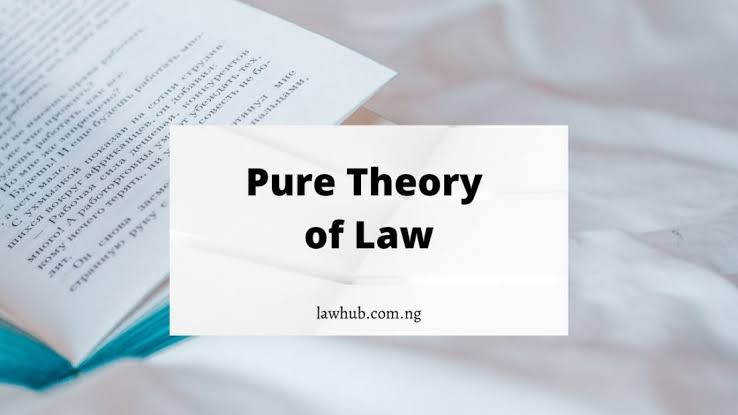PURE THEORY OF LAW
Out of the multiple theories of law, I personally do love the Pure theory of Law.
I love the concept and reasoning behind it.
So, this post is not just about the Pure theory of Law, but to also prove it as the most acceptable theory of all. Stay tuned.
To start with, it is worthwhile to note that there are several accepted theories concerning the origin of law.
These theories have been propounded over decades and centuries by many legal and non-legal individuals, philosophers, academicians, etc.
A theory is a specific but comprehensive explanation about certain aspects of how our societies work.
That is to say, a theory of law deals with, specifically or comprehensively, how the society regards the statement(s) of law, and how the law is responsible, directly or by necessary implication, for the behaviour of the society.
See also: Meaning of Summon in Law: Motion and Prayer
These philosophers that have propounded certain theories of law have done so according to their various perspectives.
However a man’s perspective or point of view, is based on his sense experience and reasoning (logical and illogical).
Therefore these perspectives, in most cases, are not universally practicable.
So, it is not surprising to realise that every theory of law leaves a vacuum somewhere. Especially when subjected to critical argumentation, conceptual analysis, and universal scrutiny.
Foundation of other Law Theories: Pure Theory of Law
However, the Pure Theory of Law has shown to be the source and foundation of all other theories.
Pure theory of law states that the validity of a law is based this. The fact that a law is created, and can be traced to, a higher norm.
This school of thought, as propounded by Prof. Hans Kelson, says that law is a system of norms.
Hence, a norm can be traced to a higher norm, and then to another higher norm, to another greater norm, until we reach a non-law created entity, called the grundnorm.
In many countries, the constitution is regarded as this grundnorm, which determines that validity of any other norm made by any agency or body in the country.
Nevertheless, as opposed to this celebrated but controversial believe, many other people have argued that the constitution is, and should not be regarded as the grundnorm of any society.
Paraphrasing the words of Abiola Sanni, ‘the fiction that the constitution is the grundnorm is only a legal fiction.’ Note that this argument not to downgrade the Pure Theory of Law, but to prepare the ground for a greater evaluation.
Pure Theory of Law: The Process of Proof
The validity of a constitution is based on its promulgation into law as the act of the people. I will state The state of the grundnorm in due time, in the course of this work.
But as a matter of priority and importance, the reason for the proposition of the pure theory of law as the most accepted theory of law must be treated first, for it is the main aim of this work.
See also: Natural Theory of Law
Now, let me hasten to state this. The most realistic competitor of the pure theory of law is the Natural law school.
So many people will be of the opinion that the natural law is the foundation of every law. You know, including the pure theory of law.
But in a bid to give solution(s) to the problem of ‘multiple consciences’, things get rough. It is undeniable to state that a natural law/rule must be subject to some logical qualities and evaluations. You know, for us to regard it as law.
The Natural theory of Law poses the problem of Multiple Consciences.
Innate Principles as subject to Pure Theory of Law
Therefore, the principles that tells man what is right, fair, and just, are subject to a higher law.
Aside from this, these principles, which we know to be innate to man, are developed by man’s environment and societal socialization.
So, if we give birth to and a raise a child where fellow humans are killed as served as meals, he would see nothing absurd at all in carrying out, at his conscience convenience, the act we call ‘murder.’
See also: Positive Theory of Law
The child will even see it as a law of nature, too bad! So, these innate principles that define fairness, truthfulness, and justice in man are really subject to a higher norm that I call ‘Societal Behaviour.’
Conclusion on the Pure Theory of Law
Without much ado, it is clear that every other theory of law is, either directly or philosophically, a derivative of the Natural Law. And relies on it for its justification.
If we give critical analysis to The Positive law school, Historical law school, and sociological law school, we can trace them all back to Natural law.
And so can the Utilitarian, Realist, and Marxist theories.
Therefore, if the Natural law itself, which can be regarded as the father of all other theories, is a mere system of norms, then it is subject to the imperial Pure Theory of Law.
See also: Similarities and Differences between Natural and Positive Theory of Law
Referances:
Plato.stanford.edu/entries/lawphil-theory/


Leave a Reply